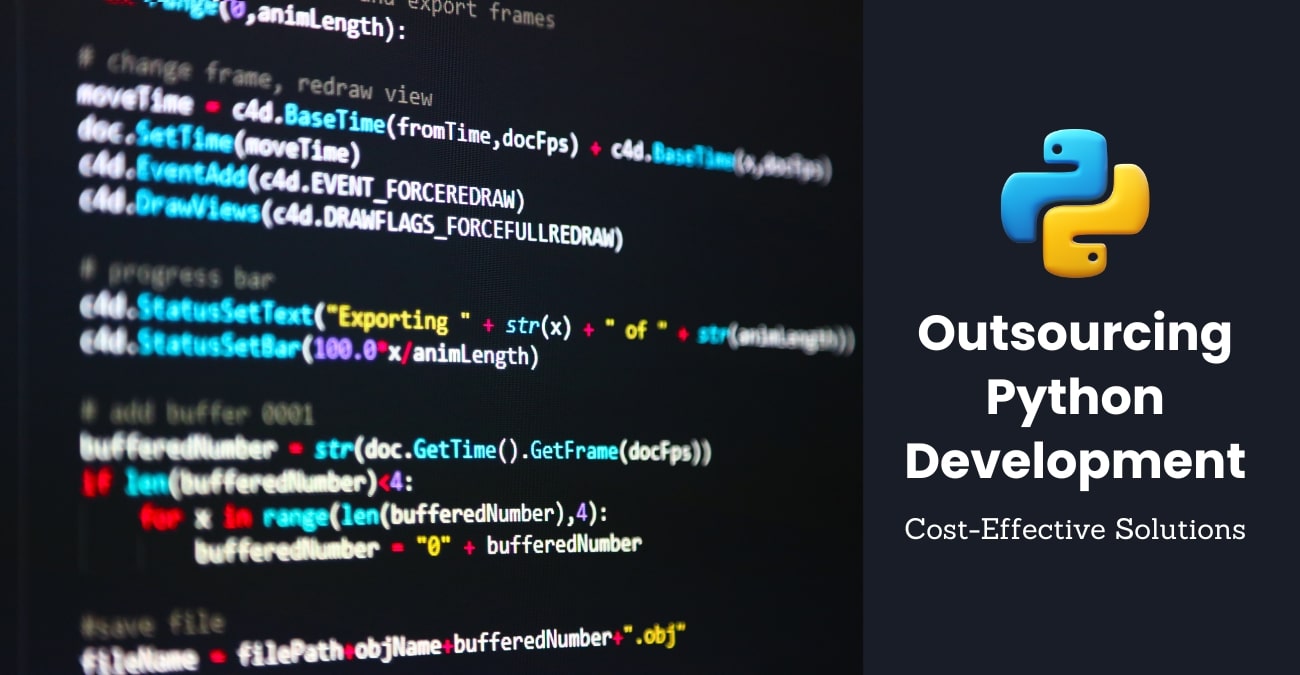
Since the present business world is tech-driven, companies are constantly seeking ways to cut expenses and boost productivity. One smart and cost-effective approach within the realm of software development is outsourcing Python development.
In this article, we’ll delve into the world of outsourcing Python development to give you a thorough understanding of this strategy. We’ll explore its perks, hurdles, and the key things you should keep in mind:
What’s Python Development Outsourcing All About?
Python development outsourcing simply means getting assistance from outside developers or teams to handle your Python-based software projects.
Python is a versatile programming language known for its easy-to-understand syntax and a wealth of libraries that support a wide range of applications, including web development, data analysis, and artificial intelligence.
Why Outsource Python Development?
Consider these arguments in favor of outsourcing your Python programming:
1. Cost Savings: Let’s start with the big one. Opting for Python development outsourcing can lead to significant cost savings. When you hire in-house developers, you’ll have to manage expenses like salaries, benefits, office space, and equipment costs. Outsourcing allows you to tap into skilled Python developers without the hefty overhead.
2. Access to Global Talent: Outsourcing opens doors to a global talent pool. You can choose from a diverse range of Python experts with various skills and expertise, ensuring you find the perfect fit for your project.
3. Focus on What You Do Best: Outsourcing Python development lets your business concentrate on its core strengths while letting experts handle the software development side. This can lead to increased productivity and a sharper competitive edge.
4. Speedy Development: With a dedicated team of Python developers, projects tend to get finished faster. Python Outsourcing partners often have experience with similar projects, which helps speed up development without sacrificing quality.
5. Easy Scalability: Outsourcing offers the flexibility to scale your development team up or down as needed. Whether you need a single Python developer or a whole squad, outsourcing can adjust to your needs.
6. Lower Risk: Reputable outsourcing firms have well-established processes and quality control measures. This means fewer worries about project delays or failures, giving you peace of mind.
Challenges of Python Development Outsourcing
While outsourcing Python development comes with plenty of advantages, it’s not a walk in the park. Here are some common hurdles to watch out for:
1. Communication Barriers: Working with a remote team can lead to communication hiccups due to time zone differences, language barriers, or cultural disparities. Good communication is essential for project success.
2. Quality Control: Ensuring the code and final product’s quality can be tricky when working with an external team. You need a robust quality assurance process in place.
3. Data Security Concerns: Depending on your project’s nature, data security can be a concern when outsourcing. It’s crucial to choose an outsourcing partner with strong security protocols.
4. Intellectual Property Issues: Clear ownership and intellectual property rights need to be established from the start to prevent disputes later on.
5. Hidden Costs: While outsourcing can be cost-effective, unforeseen expenses like additional revisions or scope changes can crop up if not managed properly.
Essential Factors to Consider When Outsourcing Python Development
To ensure your outsourcing venture is a success, take these factors into account:
- Project Scope and Objectives: Clearly define your project’s scope, objectives, and expectations. A well-documented project brief helps your outsourcing partner understand your requirements.
- Choosing the Right Partner: Research and select an outsourcing partner with a solid track record in Python development. Check reviews, case studies, and client testimonials to gauge their expertise.
- Effective Communication: Set up efficient communication channels with your outsourcing team. Regular updates, meetings, and feedback sessions are crucial for project progress.
- Clear Contracts: Draft a comprehensive contract that covers project details, timelines, milestones, payment terms, and intellectual property rights. Legal clarity is essential.
- Quality Assurance: Implement a rigorous quality assurance process to ensure the final product meets your standards and requirements.
- Data Security Measures: Discuss data security with your outsourcing partner and ensure they comply with relevant data protection regulations.
- Project Management: Assign a project manager on your side to coordinate with the outsourcing team and oversee project progress.
- Flexibility: Be open to feedback and changes during the development process. Flexibility can lead to a smoother project outcome.
Managing the Scope, Budget, and Timeline for a Python Project
Managing the scope, budget, and timeline of a Python project is like steering a ship to a successful destination. Here’s how you can do it:
1. Start by getting crystal clear on what your project needs to achieve. Write down all the details in a scope document. Then, create a project plan that lays out all the tasks, milestones, and deadlines.
2. Figure out how much money you’ll need for the project. Consider everything from development costs to software and hardware expenses. Also, think about the people and tools you’ll need. Make sure your project timeline is realistic. Don’t forget to account for any potential hiccups along the way.
3. Changes to the project scope should be carefully managed. Document them, assess how they affect the budget and timeline, and get approval from stakeholders before making changes.
4. Keep a close eye on your budget. Track all your expenses and compare them to what you planned. You can use spreadsheets or project management tools to help with this.
5. Regularly check how your project is progressing against the timeline. If there are delays or changes needed, communicate them to your team and stakeholders. Project management software can make your life easier by keeping everything organized in one place.
6. Hold regular meetings with your team to discuss progress and challenges. Document everything along the way, from scope changes to budget updates.
7. Keep stakeholders in the loop about the project’s status, especially if anything changes. Always be ready for unexpected challenges by assessing project risks. And don’t forget about quality – make sure your budget and timeline allow for thorough testing.
8. Finally, review your project plan regularly and make adjustments as needed to stay on course.
By following these steps and staying organized, you’ll have a better grip on your Python project’s scope, budget, and timeline, which will lead to a smoother and more successful journey.
Conclusion
Outsourcing Python development is an innovative, cost-effective solution that offers numerous benefits, including cost savings, access to global talent, and faster project completion. However, it would be best if you tackled challenges like communication barriers and quality control.
Managing the scope, budget, and timeline of a Python project is a critical aspect of ensuring its success. Businesses can maintain control over these essential project aspects by following a structured approach that includes clear documentation, realistic budgeting, diligent tracking, and effective communication.
When you’re thinking about an outsourcing partner, Codesy Consulting stands out as a top pick because of their expertise, client-focused approach, and impressive track record. By thoughtfully assessing your project needs and choosing the perfect outsourcing collaborator, you can leverage Python development to efficiently and budget-friendly propel your business forward.





